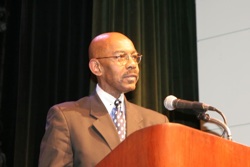RRASC intern Sophia Robohn sums up the social media response to PPI's new 50-state incarceration profile series.
by Sophia Robohn,
June 16, 2014
2 weeks ago, Prison Policy Initiative staff Peter Wagner and Leah Sakala released two briefings on profiles they created of national and state incarceration rates, a task previously performed by the federal government. The reports revealed the significant role that states play in determining what mass incarceration looks like.
Peter’s briefing, Tracking State Prison Growth in 50 States, focuses on the increasing rates of incarceration nationally and by state, dating back several decades. Leah’s briefing, Breaking Down Mass Incarceration in the 2010 Census: State-by-State Incarceration Rates by Race/Ethnicity, gives us grave figures to begin to comprehend racial disparities in every states’ prisons and jails.
For many, these conclusions are not new; but this data presented by PPI are the first intensive reports of this kind, and it is sparking new conversations about how to shape perception of mass incarceration. Prison Policy Initiative also created a set of state profiles that combines the material presented in the reports, making it easier to interpret at the state level. Supporters on social media are starting these discussions using the reports and profiles.
Piper Kerman, author and creator of Orange is the New Black, called the reports “excellent” and tweeted both the profiles and reports to her followers:
Commenting on the size and value of this data, Philip Cohen, sociologist and demographer at the University of Maryland also posted about it (which was then retweeted by Katrina vandenHeuvel, editor and publisher of The Nation):
Social justice organizations are also tweeting about the state profiles to their followers. Creating smaller community understandings of these large sets of data can help relate the work back to people, as demonstrated by these groups:
The Women’s Prison Association in New York City, an advocacy group for women in the criminal justice system, tweeted:
State advocates and civil rights group, The ACLU of Louisiana, also tweeted:
The reports also sparked some great articles. Nicole Flatow, a writer with ThinkProgress.org, highlighted our findings about state roles in incarceration rates and the hidden roles of local jails, in an article called “The Exponential Growth of American Incarceration, in Three Graphs”:
But for all the talk these past few months about the federal prison population — and the concerns there are urgent — these charts call out the major perpetrators of the prison explosion: the states, where incarceration rates have increased more than fourfold.
While the report does not focus on local jails, they make up some 30 percent of U.S. incarceration by PPI’s count. People in jails are typically held for shorter periods of time, either while awaiting trial or for less serious crimes. But these jails will also come into play as states consider reducing mass incarceration. Many put behind bars for marijuana possession, for example, end up in local jails. And Alabama earned the distinction last year of detaining the only U.S. journalist incarcerated for doing his job in a county jail.
Pete Brook wrote a great piece on his Prison Photography blog that summed up his excitement for the reports and Prison Policy Initiative’s entitled “Every Graph, Stat and Data Point You Need For Research on U.S. Mass Incarceration,” writing,
Not content with *only* filing lawsuits, pressing states to move away from Prison Based Election Gerrymandering; battling corrupt and expensive jail phone systems; and protecting prisoners’ rights to communicate unhindered by letter, PPI is committed to providing fellow prison reformers with accurate up-to-date data on mass incarceration. We cannot rely on the government to provide recent data.
PPI has used data from the more recent 2010 U.S. Census counts to measure each state’s incarceration rates by race and ethnicity. Most (57%) people incarcerated in the United States have been convicted of violating state law and are imprisoned in a state prison. Monitoring trends at the state-level is imperative.
It’s exciting to see what discussions are beginning around the state profiles on incarceration, and how people and organizations are grappling with its’ implications. We are just beginning to see how and what these profiles can be used for to improve the current standards for mass incarceration.
Sophia Robohn is supported by the Civil Liberties and Public Policy Program.










